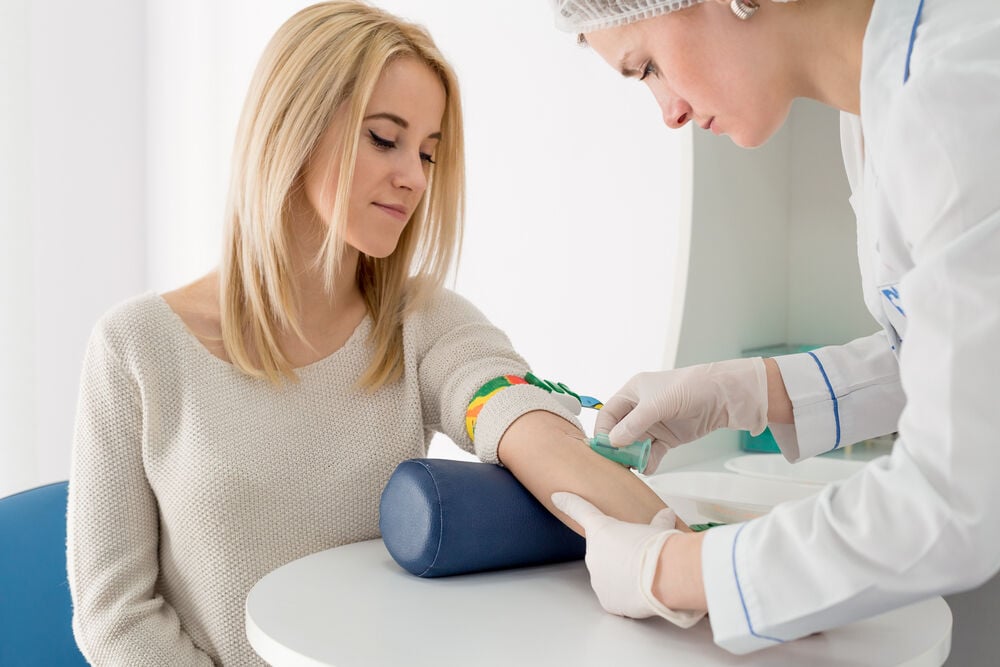If you and your partner have been unsuccessfully trying to get pregnant, you may want to seek expert advice.
-
Tracking cycle
-
Getting pregnant
-
Pregnancy
-
Help Center
-
Flo for Partners
-
Anonymous Mode
-
Flo app reviews
-
Flo Premium New
-
Secret Chats New
-
Symptom Checker New
-
Your cycle
-
Health 360°
-
Getting pregnant
-
Pregnancy
-
Being a mom
-
LGBTQ+
-
Quizzes
-
Ovulation calculator
-
hCG calculator
-
Pregnancy test calculator
-
Menstrual cycle calculator
-
Period calculator
-
Implantation calculator
-
Pregnancy weeks to months calculator
-
Pregnancy due date calculator
-
IVF and FET due date calculator
-
Due date calculator by ultrasound
-
Medical Affairs
-
Science & Research
-
Pass It On Project New
-
Privacy Portal
-
Press Center
-
Flo Accuracy
-
Careers
-
Contact Us
Fertility Tests for Women: A Comprehensive Overview


Every piece of content at Flo Health adheres to the highest editorial standards for language, style, and medical accuracy. To learn what we do to deliver the best health and lifestyle insights to you, check out our content review principles.
When should you consider female fertility testing?
Most women who have trouble becoming pregnant do go on to enjoy a normal pregnancy and deliver a healthy baby. A fertility specialist will be able to tell you about lifestyle factors and underlying conditions that may be affecting your ability to conceive.
Here’s a rule of thumb to keep in mind: most couples will conceive a child within a year of regular sex without contraception. If you’re under the age of 35 and you’ve been trying unsuccessfully for this long, it’s time to consult a doctor (but do so after six months if you’re over 35).
How to test female fertility: types of tests
1. Cervical test
If you’re having trouble getting pregnant, your doctor may suggest a cervical screening test (sometimes called a Pap smear). These tests check for cervical cancer and other problems with the cervix that can interfere with fertility.
During a cervical test, your doctor will use a small, soft brush to take a sample of cells from the surface of your cervix. The procedure can be uncomfortable, but isn’t painful. The sample is then sent to a laboratory for analysis. The results will be available through your clinic shortly afterwards. Also, you may discuss STD testing with your doctor.
2. Ovulation test
Some women have trouble getting pregnant because of problems with ovulation. This can be assessed using ovulation testing kits that are commonly available in clinics and drugstores.
An ovulation test can safely and accurately be done at home. These kits work by testing your urine for the presence of luteinizing hormone, which rises in concentration in the 24–36 hours before ovulation. Some of them also detect an estrogen increase before ovulation.
3. Ultrasound test
This is sometimes called a transvaginal ultrasound and involves your doctor inserting a wand-like ultrasound device into your vagina. With this device, they’ll be able to review highly detailed images of your uterus and ovaries to check for any abnormalities. Ultrasound imaging uses sound waves that are completely harmless.
4. Hormone blood test
A number of hormones can have an impact upon a woman’s fertility. For instance, a blood test for progesterone may be helpful in cases of reduced fertility. Doctors use this test to determine if you have normal levels of circulating progesterone, indicating that ovulation is taking place.
Similarly, your blood can also be tested for follicle-stimulating hormone (FSH), which prepares an egg to be released from your ovaries. Women with fertility problems sometimes have excessively high levels of FSH.
Your doctor may also suggest testing for the hormone prolactin if you’re having trouble conceiving. Prolactin is mainly produced in the pituitary gland, and its high levels can block ovulation. A benign pituitary tumor, or a prolactinoma, can cause high levels of prolactin in the blood (hyperprolactinemia). Thyroid problems and some drugs that reduce dopamine levels can also cause hyperprolactinemia.

5. Hysterosalpingogram
The health of your uterus, ovaries, and fallopian tubes is an important factor when trying to get pregnant. Your doctor can offer you a number of ways to check for problems in your reproductive system. A hysterosalpingogram (HSG) is sometimes known as a “tubogram” because it allows the doctor to examine the condition of your fallopian tubes.
The HSG can check for blockage of the fallopian tubes or defects of the uterus that can affect fertility. Your doctor will typically perform the tubogram immediately after your period. They will take a series of X-rays of your reproductive system after injecting a harmless dye into your vagina. Sometimes the doctor might use saltwater and air in an HSG instead of a dye, and an ultrasound instead of X-rays.
6. Hysteroscopy
A hysteroscope is a thin, flexible tube with a camera at one end. To perform a hysteroscopy, your doctor will pass this tube through the cervix and into the uterus. The doctor can then visualize the structure of your reproductive system and take tissue samples to check for any signs of abnormalities.
7. Laparoscopy
If you and your doctor decide that a laparoscopy is necessary, they will make small incisions in your belly through which a camera and other investigative tools can be inserted.
This procedure allows a comprehensive examination of the entire pelvis and can treat conditions like endometriosis (a disease in which the uterus’s inner lining, called endometrium, grows outside the uterus).
Other types of tests
In addition to the above tests, a number of other assessments can indicate why you may be having trouble conceiving:
- For many women, monitoring their body temperature is a straightforward way to check if they’re ovulating. Shortly after ovulation, a rise in progesterone will cause your body temperature to increase. By taking a measurement of your temperature when you first wake up, you can indirectly tell if you’re ovulating.
- Thyroid disorders and a number of other conditions can cause irregular or absent ovulation. Your doctor will be able to suggest appropriate tests if they believe that such a condition may be affecting your ability to conceive.
How to choose the most suitable test for you
As you can see, there is a wide range of tests available to get to the bottom of fertility problems. You will not need to undergo all of these tests. Your doctor will advise you about which tests will be most helpful in your specific circumstances.
Fertility testing can be stressful for many couples, but a thorough investigation will usually reveal the cause of any difficulty conceiving.
Take a quiz
Find out what you can do with our Health Assistant


Hey, I'm Anique
I started using Flo app to track my period and ovulation because we wanted to have a baby.


The Flo app helped me learn about my body and spot ovulation signs during our conception journey.


I vividly
remember the day
that we switched
Flo into
Pregnancy Mode — it was
such a special
moment.
Real stories, real results
Learn how the Flo app became an amazing cheerleader for us on our conception journey.




